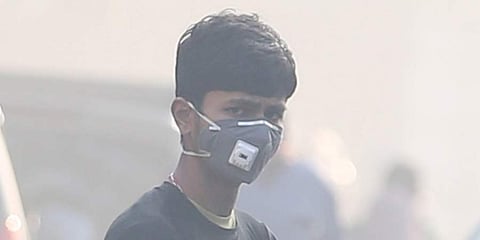

CHENNAI: With coronavirus in the air already disrupting normal life, bursting of crackers for Deepavali will only make matters worse for Chennaiites. The city’s air quality is already on the edge.The air quality in general deteriorates in the winter months of November, December and January during Deepavali and Pongal festivals.
The city’s air quality index (AQI) is inching closer to 100, which by itself causes minor breathing discomfort for sensitive people. With Deepavali just two weeks away and active monsoon days ahead, the air pollution is only going to get worse.
Director of Public Health TS Selvavinayagam unequivocally told Express that all respiratory tract infections, including Covid-19, will increase when there is a bad air quality. “We have to keep the air pollution under control even during the festival days. We are increasing the monitoring for Covid control. District teams have been alerted to prevent overcrowding, ensure wearing of masks etc. The high risk population with underlying conditions like heart diseases should stay indoors when smoke engulfs the air.”
Last Deepavali, Velachery recorded a poor AQI of about 250. During peak hours of crackers bursting, it even shot up to 436. In Alandur, it was much worse. The AQI was as high as 500. The same was the case with Manali station.
As per National Air Quality Index, AQI between 401-500 is considered severe, which affects even healthy people and seriously impacts those with diseases.Tamil Nadu Pollution Control Board (TNPCB) Chairman AV Venkatachalam said public awareness was being carried out and appealed to the public to limit the bursting of crackers. However, health experts feel that such an appeal was not enough and requested the State government to curtail the sale of firecrackers.
On Monday, Rajasthan Chief Minister Ashok Gehlot tweeted saying his government had taken the decision to ban the sale and bursting of crackers to protect the health of Covid-19 patients.Dr Maria Neira, Director of the Department of Public Health and Environment at the World Health Organization, said in countries where there is high air pollution, there is a need to enforce legislation. "We need to make sure that as citizens we are aware of the fact that the air pollution is affecting our health and by doing so, request our authorities at the city or the country level to tackle the causes of air pollution, reducing the emissions."
Dr Arvind Kumar, founder and managing trustee of Lung Care Foundation, said firecrackers cause extensive air pollution in a short amount of time, leaving traces of toxic heavy metal particles like mercury, lead etc. and harmful chemicals like cadmium, manganese etc., along with high concentrations of smoke in the air for hours and days. "Burning of firecrackers this Deepavali will only exacerbate the already precarious situation. It will make the senior citizens, pregnant women, children and those with heart or lung conditions even more vulnerable."
Dr Arun Sharma, Director of Community Medicine, University College of Medical Sciences, University of Delhi, also said the coronavirus is airborne too, and is not only transmitted by touch. "A polluted area will have more dust particles which can act as a piggyback or carrier for the virus to sit on. A water droplet can settle down, while a dust particle will remain suspended in the air for longer and easy to be contracted. A study in Wuhan found the virus up to the height of 13 feet, proving the surrounding environment has the capacity to carry the virus up to that height."
Though Tamil Nadu boasts itself of high recovery rate, there are reports of post-Covid complications particularly pulmonary fibrosis. This section of population can also get affected by bad air quality. Dr Sabine Kapasi, UN Strategy Lead for global Covid-19 task force, told The New Indian Express that, more than Covid-19 patients, the bad air quality will affect the people with pulmonary fibrosis, which is an irreversible lung dysfunction. "In India, we don't have data on post-Covid complications. The global estimates shows that 12-14 per cent Covid-19 patients have developed pulmonary fibrosis."